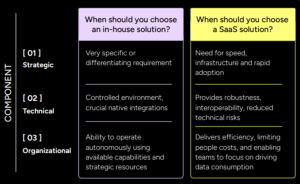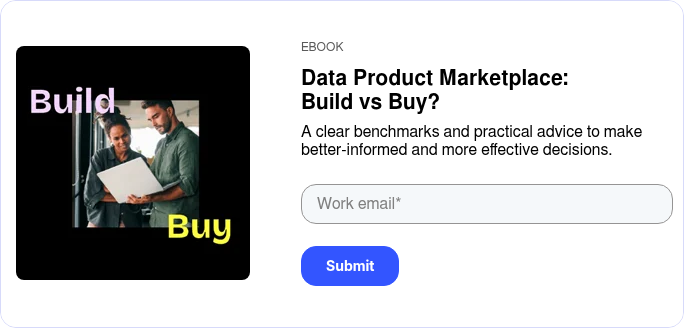The benefits of buying, not building, your data product marketplace solution
Deploying a central data product marketplace may seem to be a project your IT team can handle. However, this risks creating a suboptimal solution that doesn’t meet corporate or user needs. In this post, we explain why partnering with an external SaaS vendor is the best option - and what to look for in your partner.

Organizations face a pressing need to harness their growing volumes of data and effectively share it internally and externally. That’s why they are increasingly adopting centralized data product marketplace solutions that unify their data assets and provide secure access for employees and stakeholders, advancing data democratization and turning data into business value.
To be effective these central data product marketplaces for data sharing require powerful functionality, an intuitive interface and a self-service solution that is easy to maintain, manage, and extend. That’s why, while it may seem straightforward for IT teams to build their own solution, partnering with a specialist Software-as-a-Service (SaaS) data product marketplace provider is the better option in terms of performance, cost-effectiveness, usability and scalability. Making the right choice isn’t just about technology – it has to be based on an understanding of overall strategy, internal team efficiency, time-to-market, and adoption by the wider business.
Choosing in-house data product marketplace development
The benefits of a tailor-made solution
At a high level, developing your own data product marketplace solution in-house may seem appealing. It means that the marketplace will be a close fit for your specific needs, as it is developed solely for your own use and is based on your business requirements. At a technical level, your data and IT teams can work closely together to optimize the solution for users and ensure that it integrates closely with your data stack.
The challenges
However, the challenges of developing in-house outweigh the benefits listed above. Building your own solution from scratch requires a lot of resources – and there is the risk that development will be pushed back if IT staff are diverted to other projects. Equally, while your IT team may contain skilled programmers they are unlikely to have created a data product marketplace solution in the past. This leads to a steep learning curve, which can cause project delays or mean they deliver a suboptimal solution that fails to meet your needs. Additionally, there is the possibility of internal politics between IT and data teams causing confusion and lengthening development cycles. Finally, the new solution will have to be maintained and extended, adding to costs and pressures on your IT team.
The benefits of working with a specialist SaaS data product marketplace provider
Given the disadvantages of building your own data product marketplace, most organizations will choose to work with an external SaaS provider to underpin their solution. While there are options to deploy a data product marketplace built on open source software, this can lead to other challenges around implementation, support and scalability, as we explain in our blog The hidden costs of open source data projects.
Partnering with a commercial SaaS provider delivers benefits for all parts of the business:
Benefits for IT
By adopting an already proven data product marketplace solution, IT teams avoid the need to develop their own solution. This dramatically improves deployment times and cuts down on maintenance while allowing IT staff to focus on other projects. Equally, choosing a data product marketplace solution that integrates with the wider tech stack helps maximize value from overall technology investments by providing a single point of access to data for the business. As the SaaS provider handles key areas such as hosting and security this further reduces the overall load on the IT team and ensures solutions seamlessly scale to meet changing needs. IT also benefits from the ongoing investment that providers are making in their products, constantly improving them through innovation – something that would be impossible to replicate with an in-house solution.
Benefits for data teams and administrators
Data leaders are under pressure to maximize value from their organization’s data by securely sharing it widely across the organization and external ecosystem. A commercial SaaS solution can be deployed rapidly, enabling them to deliver data to all much faster than if they built their own solution. And, as the solution is self-service, users are able to access data themselves, reducing the number of inbound requests for specific data assets from the business. Solutions can be tailored to company needs, including applying corporate design guidelines to ensure consistency and drive user uptake.
Managing and running an external solution will also be easier for data administrators. They will have access to a proven, well-designed management backoffice, rather than having to work with technical interfaces created by the IT team.
Benefits for users
As with any new software solution, users need to be encouraged to adopt your data product marketplace. That means your solution has to go beyond technical functionality to provide an intuitive, understandable, self-service interface that anyone can use confidently. Commercial SaaS solutions have the benefit of being deployed in hundreds of organizations, and are proven to meet the needs of millions of users, of all different types. This will accelerate adoption and usage, helping build a data-centric culture across the business.
Benefits for budgets
Choosing a SaaS solution also delivers financial benefits to the organization’s bottom line. Companies avoid the costs involved in building a data product marketplace in-house, removing the need for expensive developer time as well as the ongoing resources required to manage and administer the marketplace. Marketplace providers should also be able to offer tailor-made support and share best practice advice, upskilling your team and avoiding the need to employ additional consultants to provide strategic advice on best practices, such as around data governance.

What to look for in a SaaS data product marketplace provider
Clearly, not every SaaS data product marketplace provider offers the same breadth of features, experience and capabilities. Whatever your specific needs, look for these five strengths when shortlisting and choosing a partner:
Powerful, flexible technology
At its heart, the data product marketplace solution has to be technically strong. It must:
- Be robust, scalable and secure
- Able to connect and integrate easily to the rest of your technology stack and business systems in order to automate data flows, and be adaptable to meet your needs as they grow
- Flexible so that you can tailor it to your specific needs, from overall design to connections to the specific systems and data sources in your business.Meet the highest levels of security, and be able to offer flexible hosting options, such as around sovereign cloud deployments
- Flexible.Often, data sharing requirements evolve over time, with many organizations extending their marketplaces to different audiences. Look for a technology solution that can deliver multiple marketplaces or spaces from the same solution to minimize administration and management time, and maximize flexibility.
Technology doesn’t stand still, so work with a company that has a clear development roadmap for the future and is committed and experienced in harnessing new technology, such as AI, to improve its solution.
Intuitive interface
Your data product marketplace solution needs to be user-friendly and efficient as well as powerful, offering these capabilities:
- Easy to use by all of your audiences. For non-technical users, such as employees, it should provide an intuitive, self-service interface, similar to an ecommerce marketplace, with in-built search and discovery tools that quickly connect users with relevant data assets. This interactive experience will encourage usage and help build a data culture within the organization.
- Data assets should be available in a variety of formats to meet the needs of different users – for example, through visualizations such as dashboards and maps, via APIs to automate downloads and integration for more technical audiences and in common file formats to aid re-use.
- It should support granular access rights, linked to corporate policies and directories, to ensure security and to preserve data confidentiality and compliance, while providing users with the opportunities to request access to data assets if required.
Easy administration
Once your marketplace has been created, you want to have control to ensure you can manage and extend it on an ongoing basis. You don’t want to have to rely on your technology provider to make changes for you or to have to spend hours administering your solution. Therefore ensure the solution you pick has:
- An easy-to-use back office interface that makes management intuitive, and requires minimal training.
- Built-in tools to help you continually improve your marketplace, such as no-code capabilities that let you design and build visualizations and pages quickly, without needing to know HTML.
- Comprehensive, easily accessible documentation and self-service knowledge that helps you fine tune the solution or add new features yourself in order to maximize your investment
- An efficient and responsive support team that provides fast, accurate answers to more complex issues
Experience and specialist expertise
Ensure that your provider has in-depth experience of the data product marketplace market, and a track record of delivering multiple projects to a range of clients across different sectors. Independent endorsement from leading analysts such as Gartner also adds credibility. This means that their technology and approach are both tried and tested, accelerating your project and the benefits you receive by applying best practice principles. As well as experience, look for a provider with specialist understanding of the market, including expertise at handling industry standards around data, and knowledge of relevant regulations around data compliance and sharing. This will help with knowledge transfer to your team and shorten any learning curve.
Community focus and approach
Data sharing at scale is a relatively new concept in many sectors, making it important to learn both from your vendor and other users of their solution. Therefore as well as a large, engaged client base that you can talk to, make sure your vendor has a strong team of Customer Success Managers that can advise you on best practice ways to improve and grow your marketplace. Take the time to look at the other resources your vendor and its community can provide. For example, Huwise’s Data hub brings together over 30,000 datasets that are freely available to share and combine with your own, enriching your data to make it even more valuable, while its Community space provides self-service support and advice from fellow data leaders from the company’s portfolio of over 350 customers in 25 countries across multiple industries.
Choosing the right data product marketplace solution is central to a successful data sharing program, which is why organizations should buy rather than build. Working with a specialist, knowledgeable SaaS provider who combines technology excellence with extensive experience helps create a complete solution for successful data sharing, delivers a cost-effective deployment, and builds a platform for future success.
Want to learn more about Huwise’s data product marketplace technology and approach? Book a personalized demo with our team now.
Share this post:
Articles on the same topic:






